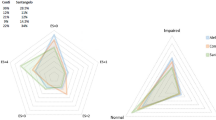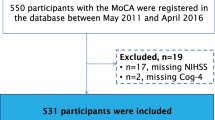Abstract
Post-stroke cognitive impairment (PSCI) includes all forms of cognitive decline that develop after stroke, even if not severe enough to fit the criteria of dementia. Our aims were to investigate the predictive value of a brief bedside examination (Montreal Cognitive Assessment, MoCA) in the acute phase of stroke on the diagnosis of mid-term PSCI, taking into account other clinical, cognitive, functional, and neuroimaging predictors. Consecutive patients admitted to a stroke unit were evaluated with MoCA between 5 and 9 days after stroke. At baseline, clinical, functional, and neuroimaging data were collected. Patients were reassessed between 6 and 9 months after stroke by means of an extensive neuropsychological and functional evaluation. Out of 137 enrolled stroke patients, 80 (58.4 %) were followed up (mean age 68.2 ± 14.6 years, males 66 %, mean NIHSS score 3.6 ± 4.8). PSCI was diagnosed in 47 patients (59 %; 35 mild cognitive impairment, 12 dementia). Controlling for age, education, functional and cognitive pre-morbid status, stroke severity, and pre-existing lacunar infarcts, MoCA baseline score [OR (95 % CI) = 1.4(1.1–1.8)] for each point] and leukoaraiosis severity [OR (95 % CI) = 0.4(0.2–0.9)] for each point of the van Swieten scale] were independently associated with PSCI. Using a ROC analysis, a cut-off of 21 predicted the diagnosis of PSCI with 91.4 % sensitivity, 75.8 % specificity, 80 % positive predictive value, and 89.3 % negative predictive value. In a sample of mild stroke patients, MoCA seems to be a good predictor of mid-term PSCI, making it a possible candidate for a brief cognitive screening in the acute stroke setting.


Similar content being viewed by others
References
Rothwell PM, Coull AJ, Silver LE, Fairhead JF, Giles MF, Lovelock CE et al (2005) Population-based study of event-rate, incidence, case fatality, and mortality for all acute vascular events in all arterial territories (Oxford Vascular Study). Lancet 366:1773–1783
Seshadri S, Beiser A, Kelly-Hayes M, Kase CS, Au R, Kannel WB et al (2006) The lifetime risk of stroke: estimates from the Framingham Study. Stroke 37:345–350
Jin YP, Di Legge S, Ostbye T, Feightner JW, Hachinski V (2006) The reciprocal risks of stroke and cognitive impairment in an elderly population. Alzheimers Dement 2:171–178
De Ronchi D, Palmer K, Pioggiosi P, Atti AR, Berardi D, Ferrari B et al (2007) The combined effect of age, education, and stroke on dementia and cognitive impairment no dementia in the elderly. Dement Geriatr Cogn Disord 24:266–273
Pendlebury ST, Rothwell PM (2009) Prevalence, incidence, and factors associated with pre-stroke and post-stroke dementia: a systematic review and meta-analysis. Lancet Neurol 8:1006–1018
Sachdev PS, Chen X, Brodaty H, Thompson C, Altendorf A, Wen W (2009) The determinants and longitudinal course of post-stroke mild cognitive impairment. J Int Neuropsychol Soc 15:915–923
Duncan PW, Zorowitz R, Bates B, Choi JY, Glasberg JJ, Graham GD et al (2005) Management of adult stroke rehabilitation care: a clinical practice guideline. Stroke 36:100–143
Miller EL, Murray L, Richards L, Zorowitz RD, Bakas T, Clark P, Billinger SA (2010) American Heart Association Council on Cardiovascular Nursing and the Stroke Council. Comprehensive overview of nursing and interdisciplinary rehabilitation care of the stroke patient: a scientific statement from the American Heart Association. Stroke 41:2402–2448
Hachinski V, Iadecola C, Petersen R, Breteler MM, Nyenhuis DL, Black SE et al (2006) National Institute of neurological disorders and stroke-Canadian stroke network vascular cognitive impairment harmonization standards. Stroke 37:2220–2241
Folstein MF, Folstein SE, McHugh PR (1975) “Mini-mental state”. A practical method for grading the cognitive state of patients for the clinician. J Psychiatr Res 12:189–198
Nasreddine ZS, Phillips NA, Bédirian V, Charbonneau S, Whitehead V, Collin I et al (2005) The Montreal Cognitive Assessment, MoCA: a brief screening tool for mild cognitive impairment. J Am Geriatr Soc 53:695–699
Rossetti HC, Lacritz LH, Cullum CM, Weiner MF (2011) Normative data for the Montreal Cognitive Assessment (MoCA) in a population-based sample. Neurology 77:1272–1275
Pasi M, Salvadori E, Poggesi A, Inzitari D, Pantoni L (2013) Factors predicting the Montreal Cognitive Assessment (MoCA) applicability and performances in a stroke unit. J Neurol. http://www.springerlink.com/openurl.asp?genre=article&id=doi:10.1007/s00415-012-6819-5 Accessed 5 May, 2013
Katz S, Ford AB, Moskowitz RW, Jackson BA, Jaffe MW (1963) Studies of illness in the aged. The index of ADL: a standardized measure of biological and psychosocial function. JAMA 185:914–919
Lawton MP, Brody EM (1969) Assessment of older people: self-maintaining and instrumental activities of daily living. Gerontologist 9:179–186
Jorm AF, Jacomb PA (1989) The informant questionnaire on cognitive decline in the elderly (IQCODE): socio-demographic correlates, reliability, validity and some norms. Psychol Med 19:1015–1022
Brott T, Marler JR, Olinger CP, Adams HP Jr, Tomsick T, Barsan WG et al (1989) Measurements of acute cerebral infarction: a clinical examination scale. Stroke 20:864–870
Van Swieten JC, Hijdra A, Koudstaal PJ, van Gijn J (1990) Grading white matter lesions on CT and MRI: a simple scale. J Neurol Neurosurg Psychiatry 53:1080–1083
de Leon MJ, Ferris SH, Blau I, George AE, Reisberg B, Kricheff II et al (1979) Correlations between computerised tomographic changes and behavioural deficits in senile dementia. Lancet 2:859–860
van Swieten JC, Koudstaal PJ, Visser MC, Schouten HJ, van Gijn J (1988) Interobserver agreement for the assessment of handicap in stroke patients. Stroke 19:604–607
Carlesimo GA, Caltagirone C, Gainotti G (1996) The mental deterioration battery: normative data, diagnostic reliability and qualitative analyses of cognitive impairment. The Group for the Standardization of the mental deterioration battery. Eur Neurol 36:378–384
Della Sala S, Laiacona M, Spinnler H, Ubezio C (1992) A cancellation test: its reliability in assessing attentional deficits in Alzheimer’s disease. Psychol Med 22:885–901
Nocentini U, Giordano A, Di Vincenzo S, Panella M, Pasqualetti P (2006) The symbol digit modalities test—oral version: Italian normative data. Funct Neurol 21:93–96
Giovagnoli AR, Del Pesce M, Mascheroni S, Simoncelli M, Laiacona M, Capitani E (1996) Trail making test: normative values from 287 normal adult controls. Ital J Neurol Sci 17:305–309
Caffarra P, Vezzadini G, Dieci F, Zonato F, Venneri A (2002) A short version of the Stroop test: normative data in an Italian population sample. Nuova Rivista di Neurologia 12:111–115
Novelli G, Papagno C, Capitani E (1986) Tre test clinici di ricerca e produzione lessicale. Taratura su soggetti normali. Archivio di Psicologia, Neurologia e Psichiatria 47:477–506
Capitani E, Laiacona M (1997) Composite neuropsychological batteries and demographic correction: standardization based on equivalent scores, with a review of published data. The Italian Group for the Neuropsychological Study of Ageing. J Clin Exp Neuropsychol 19:795–809
Bianchi A, Dai Prà M (2008) Twenty years after Spinnler and Tognoni: new instruments in the Italian neuropsychologist’s toolbox. Neurol Sci 29:209–217
Hughes CP, Berg L, Danziger WL, Coben LA, Martin RL (1982) A new clinical scale for the staging of dementia. Brit J Psych 140:566–572
American Psychiatric Association (1994) Diagnostic and Statistical Manual of Mental Disorders, 4th edn. American Psychiatric Association, Washington DC
Gauthier S, Reisberg B, Zaudig M, Petersen RC, Ritchie K, Broich K et al (2006) Mild cognitive impairment. Lancet 367:1262–1270
Popović IM, Serić V, Demarin V (2007) Mild cognitive impairment in symptomatic and asymptomatic cerebrovascular disease. J Neurol Sci 257:185–193
Dong Y, Sharma VK, Chan BP, Venketasubramanian N, Teoh HL, Seet RC et al (2010) The Montreal Cognitive Assessment (MoCA) is superior to the Mini-Mental State Examination (MMSE) for the detection of vascular cognitive impairment after acute stroke. J Neurol Sci 299:15–18
Cumming TB, Bernhardt J, Linden T (2011) The Montreal Cognitive Assessment: short cognitive evaluation in a large stroke trial. Stroke 42:2642–2644
MacKenzie G, Gould L, Ireland S, LeBlanc K, Sahlas D (2011) Detecting cognitive impairment in clients with mild stroke or transient ischemic attack attending a stroke prevention clinic. Can J Neurosci Nurs 33:47–50
Toglia J, Fitzgerald KA, O’Dell MW, Mastrogiovanni AR, Lin CD (2011) The Mini-Mental State Examination and Montreal Cognitive Assessment in persons with mild subacute stroke: relationship to functional outcome. Arch Phys Med Rehabil 92:792–798
Blackburn DJ, Bafadhel L, Randall M, Harkness KA (2013) Cognitive screening in the acute stroke setting. Age Ageing 42:113–116
Godefroy O, Fickl A, Roussel M, Auribault C, Bugnicourt JM, Lamy C et al (2011) Is the Montreal Cognitive Assessment superior to the Mini-Mental State Examination to detect post-stroke cognitive impairment? A study with neuropsychological evaluation. Stroke 42:1712–1716
Dong Y, Venketasubramanian N, Chan BP, Sharma VK, Slavin MJ, Collinson SL et al (2012) Brief screening tests during acute admission in patients with mild stroke are predictive of vascular cognitive impairment 3–6 months after stroke. J Neurol Neurosurg Psychiatry 83:580–585
Pendlebury ST, Cuthbertson FC, Welch SJ, Mehta Z, Rothwell PM (2010) Underestimation of cognitive impairment by Mini-Mental State Examination versus the Montreal Cognitive Assessment in patients with transient ischemic attack and stroke: a population-based study. Stroke 41:1290–1293
Pendlebury ST, Markwick A, de Jager CA, Zamboni G, Wilcock GK, Rothwell PM (2012) Differences in cognitive profile between TIA, stroke and elderly memory research subjects: a comparison of the MMSE and MoCA. Cerebrovasc Dis 34:48–54
Pendlebury ST, Mariz J, Bull L, Mehta Z, Rothwell PM (2012) MoCA, ACE-R, and MMSE versus the National Institute of neurological disorders and stroke-Canadian stroke network vascular cognitive impairment harmonization standards neuropsychological battery after TIA and stroke. Stroke 43:464–469
Pendlebury ST, Wadling S, Silver LE, Mehta Z, Rothwell PM (2011) Transient cognitive impairment in TIA and minor stroke. Stroke 42:3116–3121
Blackburn DJ, Walters S, Harkness K (2011) Letter by Blackburn et al regarding article, “Is the Montreal Cognitive Assessment superior to the Mini-Mental State Examination to detect post-stroke cognitive impairment? A study with neuropsychological evaluation”. Stroke 42:e582
Godefroy O, Bugnicourt JM, Fickl A (2011) Response to Letter by Blackburn et al regarding article, “Is the Montreal Cognitive Assessment superior to the Mini-Mental State Examination to detect post-stroke cognitive impairment? A study with neuropsychological evaluation”. Stroke 42:e583
Leys D, Henon H, Mackowiak-Cordoliani MA, Pasquier F (2005) Poststroke dementia. Lancet Neurol 4:752–759
Debette S, Markus HS (2010) The clinical importance of white matter hyper intensities on brain magnetic resonance imaging: systematic review and meta-analysis. BMJ 341:c3666
Christa Maree Stephan B, Minett T, Pagett E, Siervo M, Brayne C, McKeith IG (2013) Diagnosing Mild Cognitive Impairment (MCI) in clinical trials: a systematic review. BMJ Open 3. doi:10.1136/bmjopen-2012-001909. Accessed 5 May, 2013
Acknowledgments
We wish to thank Dr. Susanna Melkas (Department of Neurology, Helsinki University Central Hospital, Helsinki, Finland) for useful comments and criticism on the paper. This study did not receive any corporate, governmental or institutional sponsorship.
Conflicts of interest
Dr. Salvadori, Dr. Pasi, Dr. Poggesi, and Dr. Chiti report no disclosures, Dr. Inzitari has served on a scientific advisory board for SERVIER, serves on the editorial board of Stroke and Cerebrovascular Diseases, is associate editor of Neurological Sciences, and has received speaker honoraria from Bayer Schering Pharma, Novartis, Pfizer Inc, and Sanofi-Aventis. Dr. Pantoni serves on the editorial boards of Acta Neurologica Scandinavica, International Journal of Alzheimer's Disease, and Cerebrovascular Diseases, and as Vascular Cognitive Impairment Section Editor for Stroke.
Ethical standard agreement
This study was approved by the local ethics committee.
Author information
Authors and Affiliations
Corresponding author
Rights and permissions
About this article
Cite this article
Salvadori, E., Pasi, M., Poggesi, A. et al. Predictive value of MoCA in the acute phase of stroke on the diagnosis of mid-term cognitive impairment. J Neurol 260, 2220–2227 (2013). https://doi.org/10.1007/s00415-013-6962-7
Received:
Revised:
Accepted:
Published:
Issue Date:
DOI: https://doi.org/10.1007/s00415-013-6962-7




